Vocation Page
A Chapter In My Life
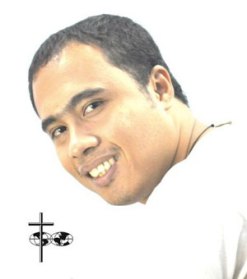
By Jason Antiquera
The Beginning of the Chapter.
Stories we read in books are often broken into chapters not only so that readers can have a good stopping point in reading but also to indicate movement and shifts in time, situations and, in some case, places in the story. My period of regency, which is a time of discernment while being out of seminary formation, was a particular and important chapter in the story of my life. Such a period indicated a serious time of reflection on the movement of the Spirit in my life as it unfolded in and through my daily experience.
How did my regency come about? It all started when I decided to leave the Columban formation program after 17 months of my two-year First Mission Assignment (FMA) in Peru in 2008. My decision came from so many challenges that I needed to face, both internal and external to me. In my first eleven months in Peru, I underwent four surgical operations, three of them major, and was held up twice in the parish where I was assigned. In my ‘leaving’ puzzle, there were also other areas of concern such as my questions concerning my vocation to the missionary priesthood. Several days after I arrived in Manila from Peru on 1 December 2008, I asked for a regency program here in the Philippines so that I could have at least one year of formal discernment.
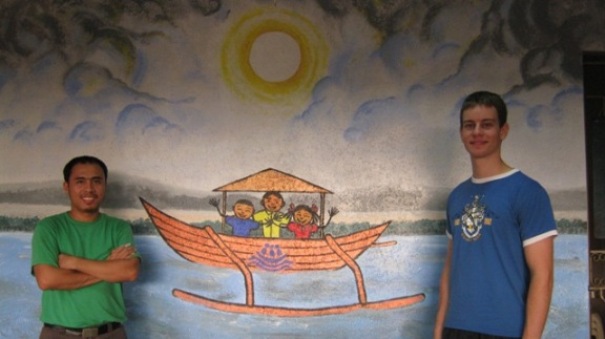
Mural by Jason left, on the wall of the Daycare Center of L'Arche Punla in Cainta, Rizal, with Jörg Leins from Germany who spent a year at Punla as an assistant.
On the Movements in Life.
My life-situation during regency could be divided into three major movements: from being a trainee in a call center in Quezon City for three weeks to being a substitute Christian Living Teacher for three months at Don Bosco School, Manila, and finally as Luzon Mission Animator for the Columban Mission Awareness Ministry for one year. I lived in three different boarding houses where I rented a room. Along the way, I met and worked with different people and have made several friendships. I never had such a rapid movement in my life as during that year. At some point, I felt tired of moving since it implied adjustment to new environments and people. I considered myself a wanderer – someone who constantly moves, without a permanent place to stay and where home is the moving. I came to understand life as a wandering – a search for a real home, for the heart, for the ultimate treasure, for the truth, for peace and joy, for an unconditional love, for the real God. I have realized that situations change, that you move in space and that people come and go, yet God is a faithful companion of a wanderer.

'Be Not Afraid,' by Jason.
On the Value of Life.
‘When everything fails, choose life’ is a phrase I read somewhere that remained with me like an inscription engraved on a rock because it hit me deeply. Did I feel like a failure? When I entered the seminary in 2002, I was naively looking forward to a one-way, straight road ahead and tried to surpass every challenge for the sake of walking on that same path. Yet, one day I woke up on a road I had never initially planned to take on. When I found myself no longer walking on the path where I started, I asked, ‘Why did I leave that road? How come I feel lost?’ Another self-directed question followed: ‘Am I really lost?’ I found that changing the route on a journey is necessary, like the experience of Joseph and Mary, with the baby Jesus, who ‘went back to their own country by a different road (Mt. 2:12),’ to avoid Herod. Changing the route has also changed my image of God.
I learned how to be independent, to re-create my life and lead it accordingly. I learned to face the world and its challenges alone and squarely, without fear. When I started taking on that view, I asked myself, ‘Have you become arrogant?’, ‘Where is God in your life after all these years?’ I have experienced a God who is expressed in a song, ‘I will be Yahweh who walks with you…in every land…strong and constant is my love’ and in the words of the Lord to Gideon in the book of Judges, ‘Go in the strength that you have…I will be with you (Judges 6:14, 16)’. Such an insight became a foundation of a real inner freedom. I had a metaphor of my relationship with God as a vehicle on a journey where God is the driver and I a passenger, where life was being driven by God’s will so-called (in a false understanding of the concept). I still have that same image at present. However my life experience has reformed it: I am the one driving the vehicle and God is my constant companion. In this way, I have come to experience God’s unconditional love and faithful presence in my life.
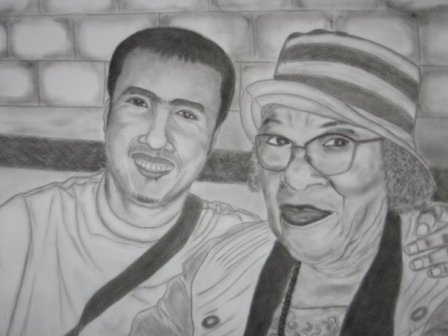
Portrait of Jason and Mother Thomas, African-American woman whom he used to visit as part of his ministry to elderly people in Chicago. Jason’s painting was an exhibit at Chicago Cultural Center, June-July 2007, on the theme ‘Intergenerational Moment’. Mother Thomas was so happy at her portrait being exhibited that Jason gave her a photo of it as a souvenir before leaving Chicago.
On the Guides and People in our Lives.
One of the best stories that I have ever come across is Dante’s Divine Comedy. One thing that struck me throughout Dante’s expedition, from inferno through purgatorio until reaching paradiso, was the presence and the role played by his guide, Virgil. Throughout my time of discernment, the presence of guides, particularly my spiritual director, has been vital to me. It helped me focus my attention on the path, which I left, where I wanted to return despite the distractions around me. I considered my director as a personification of God’s guidance, like a light that shines over the path while you pass through a dark forest. My spiritual direction made me feel whole when I shared my entire story without fear and without being judged – just a complete surrender, like being totally naked in front of God. Through it, I have renewed my commitment to trust and let go of the last piece of doubt I was holding onto. Every moment of spiritual direction is a moment of prayer and a revitalized commitment to freedom, which is the fountain of God’s unconditional love.
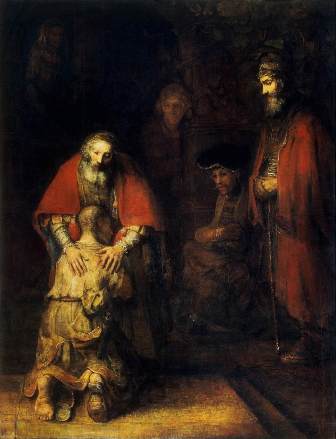
The Return of the Prodigal Son, Painting by Rembrandt
End of a Chapter.
I remember reading Henry Nouwen’s The Return of the Prodigal Son, a reflection on Rembrandt’s painting on the same theme, on the Fourth Sunday of Lent (14 March) since the parable was the Gospel for that Sunday. Reading the book touched me deeply. I realized my desire to return to the community that I had once left. I felt empathy towards the younger son in the story while saying to myself, ‘I hope to be given that chance to return, the same as the younger son in the story.’ In 24 March, ten days after I read the book and five days after my interview with the evaluation board, I received news from Fr Patrick O’Donoghue, the Regional Director, welcoming me back to the seminary. I felt that the story told by Luke had became part of my real life story and made me say, ‘I now know literally how it feels to return and be welcomed!’ I feel happy but I am not thinking of a live-happily-ever-after-return to the seminary community. I know that some inner struggles don’t really go because, in fact, some become part of a cross that I need to carry. Yet, I believe in Christ’s call to metanoia – a change of heart – where all things are made new as we take on a new perspective and new mode of looking at and responding to life.
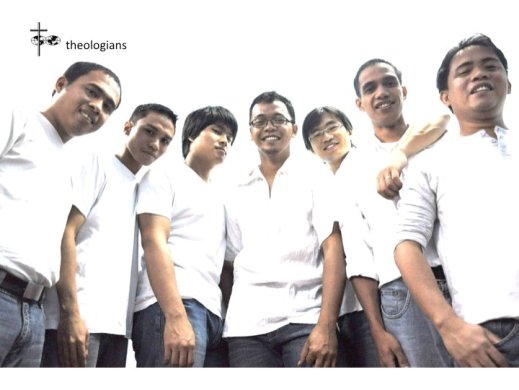
Jason with some fellow Columban Seminarians.
You may email Jason at redex01@yahoo.com
